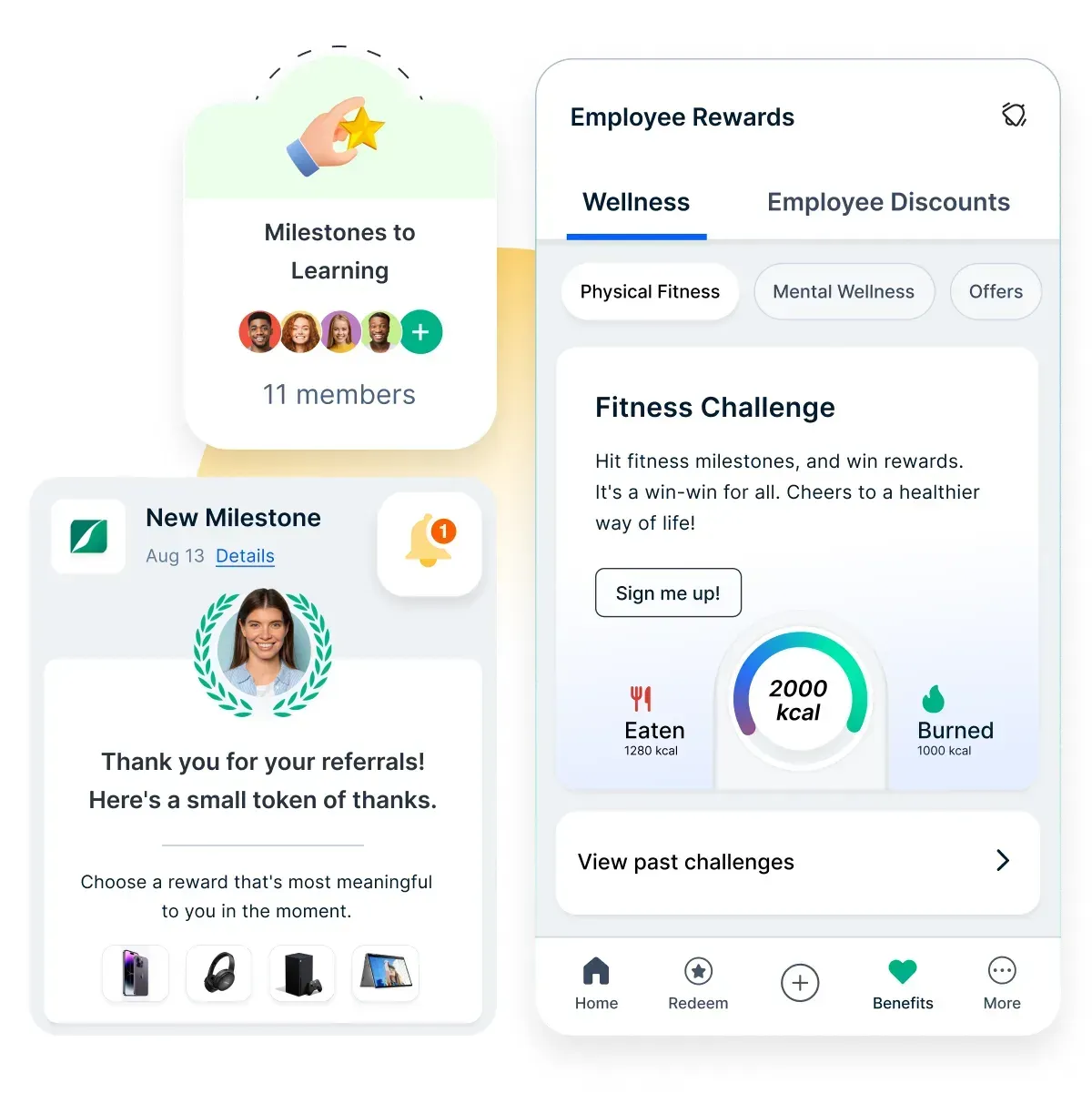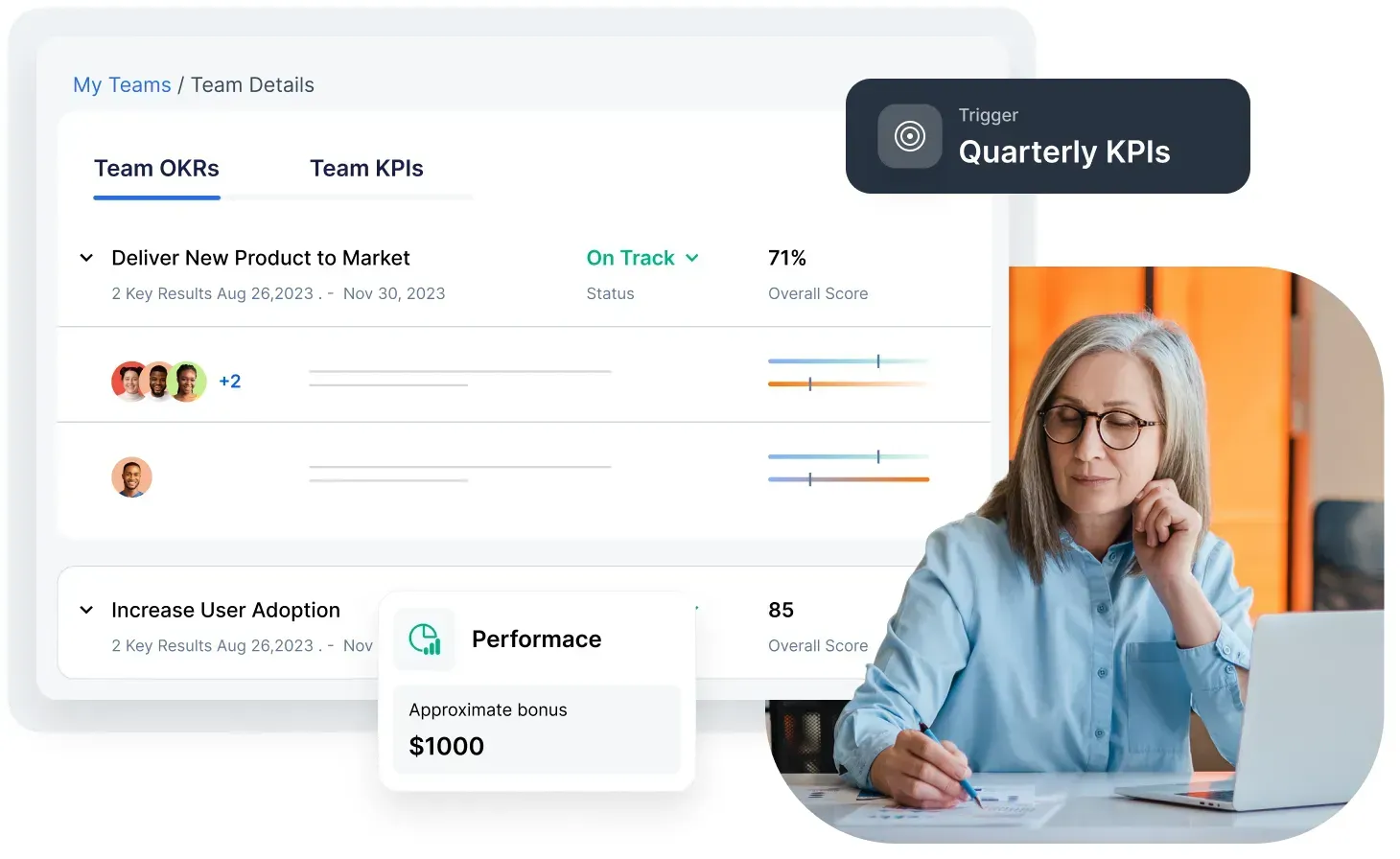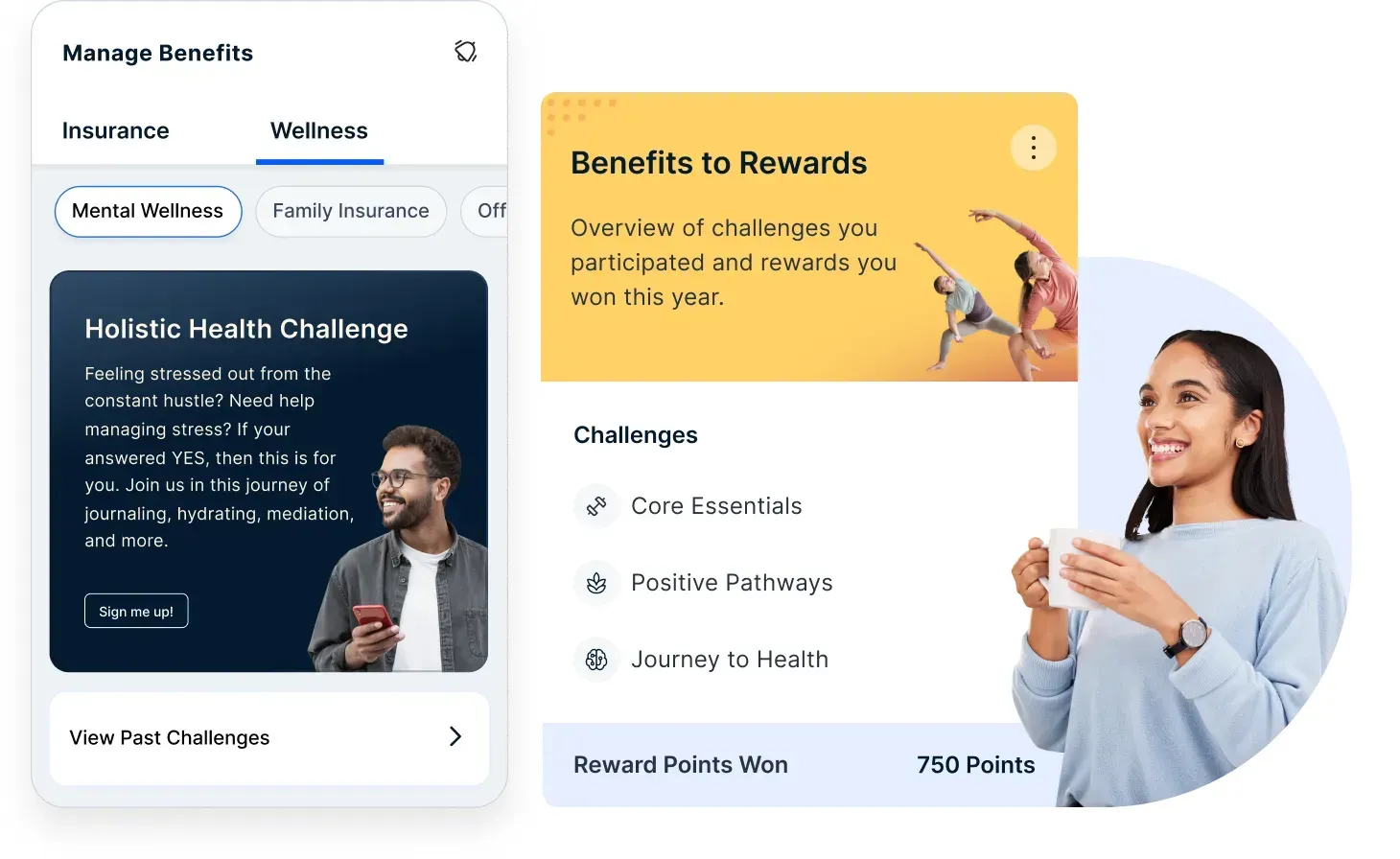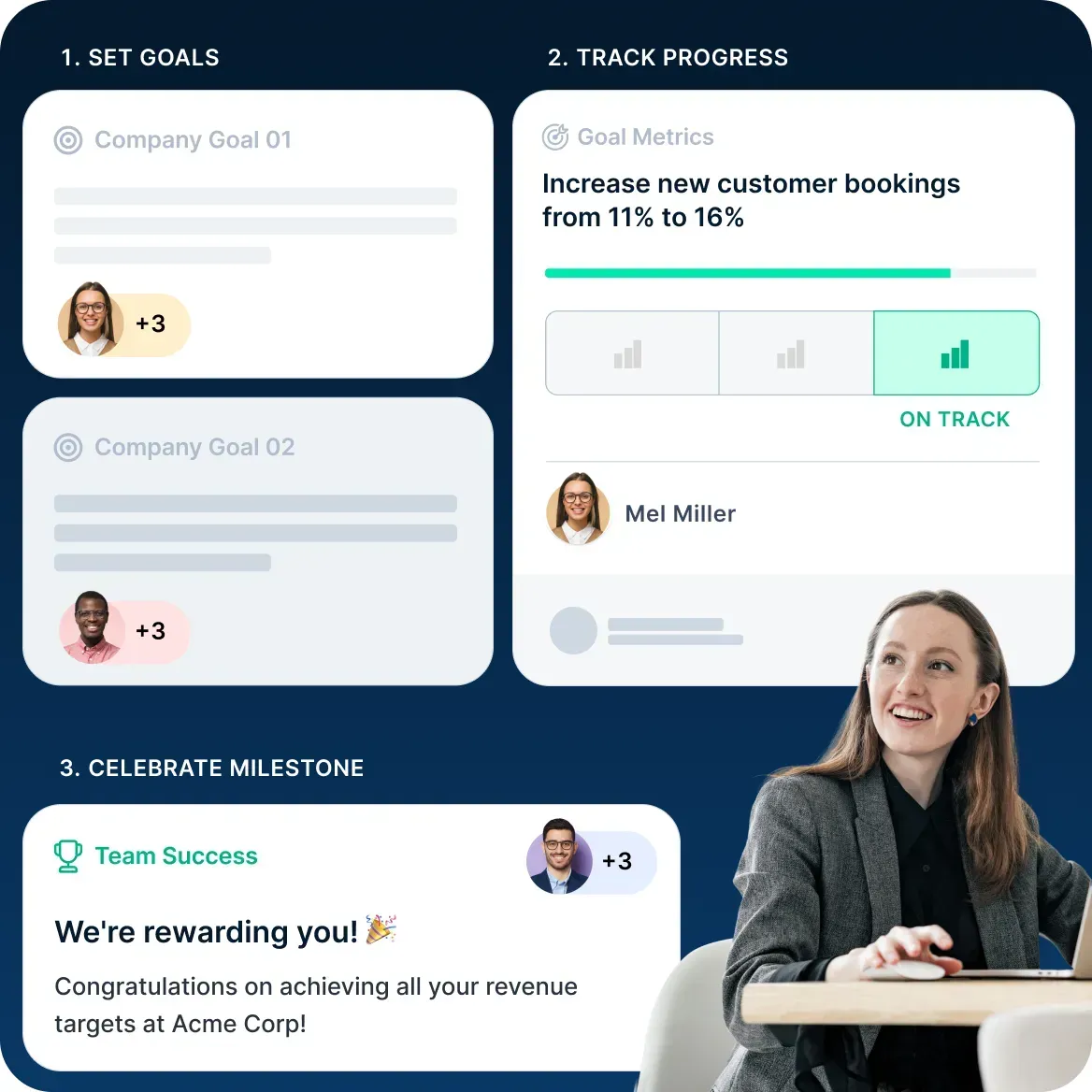Milestone Awards for Employees: Why They Matter and How to Run Them
Milestone awards for employees are more than just tokens of appreciation—they’re powerful tools to celebrate employee milestones, boost engagement, and build loyalty. Learn how a recognition program can drive long-term success for your organization.
On this page
Appreciation in the workplace is more than just a feel-good gesture—it directly impacts retention and employee satisfaction. In fact, a study by SelectSoftware Reviews revealed that 66% of employees would consider leaving their job if they don’t feel appreciated. While a simple “thank you” is important, organizations that go a step further with milestone awards for employees create lasting impressions.
Recognizing employee milestones—like work anniversaries or years of dedicated service—is a powerful way to show employees they matter. It’s not just about handing out rewards; it’s about celebrating commitment, reinforcing a positive culture, and building emotional connections at key moments.
A well-structured employee milestone recognition program does more than just mark time—it tells employees that their contributions are valued and remembered. In this post, we’ll dive into why milestone awards matter, their key benefits, and how to build a meaningful program that truly resonates.
What are milestone awards for employees?
Milestone awards for employees are recognition rewards given for significant achievements or milestones. Examples of employee milestones are years of service and completion of key projects.
These awards are formal acknowledgments of an employee's dedication and contributions, reinforcing their organizational value. Celebrating these milestones motivates employees and cultivates a positive workplace culture where achievements are recognized and appreciated.
The employee milestones examples mentioned above require awards that recognize employees:
1. Service awards
These are given to employees who reach significant work anniversaries, such as 5, 10, or 20 years with the company. Service awards often include plaques, trophies, or certificates that commemorate the employee’s dedication.
2. Performance awards
Awarded for achieving specific performance targets or exceptional project outcomes. These can include bonuses, gift cards, or even paid time off, depending on the significance of the achievement.
3. Recognition awards
These awards acknowledge individual contributions or innovations that have positively impacted the team or company. They might come in the form of public recognition, personalized gifts, or special events.
4. Achievement awards
Given for significant accomplishments such as completing a major project, winning a prestigious client, or overcoming a challenging problem. Achievement awards can be more substantial and include extra vacation days or high-value gifts.
5. Peer-to-peer awards
Allow employees to recognize their colleagues for exceptional work or support. These can be more informal and might include nominations for "Employee of the Month" or similar recognitions.
According to a Gallup poll, organizations with high employee engagement levels are 21% more profitable.
Benefits of milestone awards for employees
Implementing milestone awards can have a profound impact on your organization. Here’s why:
1. Boosts employee morale and motivation
Celebrating milestones like work anniversaries makes employees feel appreciated and valued. This recognition fosters a sense of pride and accomplishment, boosting morale and encouraging them to stay engaged and productive.
2. Increases employee retention
Employees who feel recognized for their loyalty and contributions are more likely to stay with the company. Milestone awards help reinforce a sense of belonging and reduce the likelihood of attrition, especially during critical tenure periods like 1 or 5 years.
3. Strengthens emotional connection with the organization
Milestone celebrations create a lasting emotional impact, especially when personalized and shared across teams. They remind employees of their journey and growth within the company, deepening their connection to the organization’s mission and values.
4. Promotes a culture of recognition
By publicly acknowledging work anniversaries and achievements, companies reinforce a culture where appreciation is visible and normalized. This sets a positive tone and encourages others to recognize peers more often, creating a ripple effect.
5. Encourages long-term performance and loyalty
Knowing their loyalty will be acknowledged and celebrated encourages employees to commit long-term. Milestone awards are key touchpoints that motivate sustained effort, helping organizations build a stable and high-performing workforce.
How to build a milestone awards program for employees?
A milestone awards program is a powerful way to recognize and reward employee loyalty, celebrate career achievements, and foster a strong culture of appreciation. When done right, it boosts morale, improves retention, and strengthens employee-employer relationships.
Here’s a step-by-step guide to building an impactful milestone awards program for employees and how Empuls can help you bring it to life effortlessly.
1. Identify the milestones you want to celebrate
Begin by defining what milestones matter most to your organization. Commonly recognized milestones include:
- Annual work anniversaries (1, 3, 5, 10, 15, or 25 years)
- Career achievements or project milestones
- Unique, culture-specific milestones (such as “first client win,” “100 days with the company,” or “5 completed certifications”)
Empuls supports various milestone types, from standard service anniversaries to fully customizable awards, helping you align the program with your company’s culture and values.

2. Automate the awards workflow to ensure consistency
Automate your milestone award process to avoid manual tracking and reduce administrative effort. With Empuls, you can:
- Automatically fetch employee data like joining dates from your HRMS
- Create recurring workflows for service milestones (e.g., 3, 5, or 10 years)
- Set triggers to send notifications, schedule emails, and auto-distribute rewards on the appropriate dates
This ensures no milestone goes unrecognized and allows HR teams to focus more on strategy than operations.

3. Personalize every celebration to make it memorable
Recognition feels more meaningful when it's personalized. Empuls allows you to:
- Customize award certificates with the employee’s name, years of service, and your company’s branding
- Send heartfelt congratulations from colleagues via a digital Wishboard
- Publish the celebration on the company’s social recognition feed, inviting peers to share GIFs, photos, and messages
This turns a simple milestone into a heartfelt, company-wide celebration that employees will remember and cherish.
4. Offer employees a choice of meaningful rewards
Every employee values something different. Instead of a one-size-fits-all reward, give them the freedom to choose. With Empuls, you can curate a tailored collection of rewards for each milestone, including:
- Gift cards from 8,000+ global brands
- Branded company swag or curated gift boxes
- Experiences, wellness perks, and travel options
- Amazon products and charitable donations
This flexibility ensures that the reward resonates with the recipient, making the recognition meaningful.

5. Stay cost-effective and compliant
Managing costs while delivering quality rewards is crucial. Empuls helps you:
- Pay only when rewards are redeemed, eliminating wastage and upfront inventory costs
- Avoid inflated markups and processing fees
- Stay compliant with tax regulations (like IRS tax-free thresholds) for service awards
- Maintain detailed reports for auditing and reconciliation
This gives you full control over budgets without compromising on the employee experience.
6. Track impact and continuously improve
Finally, measure how your milestone awards program is performing. Empuls offers detailed analytics and reports that let you track:
- Award delivery and redemption rates
- Employee participation and engagement
- Budget utilization and cost-effectiveness
- Overall impact on morale and retention
Use this data to refine your approach, identify gaps, and ensure your program continues to grow in value.

Why Empuls is the ideal platform for milestone recognition
Empuls is an AI-powered, end-to-end employee engagement solution that makes setting up and running milestone awards easy. It offers:
- Full automation of award workflows
- Custom branding and personalization
- A global catalog of meaningful rewards
- Peer recognition features like Wishboards and social feeds
- Tax compliance and budget management tools
Whether you're just starting your milestone awards journey or looking to enhance an existing program, Empuls provides everything you need to create a culture of appreciation and memorably celebrate employee loyalty.
Best practices for a successful milestone awards program
Here are five best practices for implementing a successful milestone awards program for employees:
1. Start with clear milestone definitions
Clearly define which milestones your organization will recognize. Common examples include:
- Work anniversaries (1, 3, 5, 10+ years)
- Key achievements (first project launch, major sales goal, certifications)
- Personal career milestones (promotions, leadership transitions)
2. Make recognition public and inclusive
Recognition has a greater impact when shared with the wider team. Celebrate milestones through:
- Company-wide emails or announcements
- Social feeds and recognition walls on Empuls
- Peer shout-outs and reactions
3. Offer personalized and meaningful rewards
Avoid generic gifts. Instead, offer employees the freedom to choose from a diverse reward catalog that aligns with their preferences. Empuls offers:
- Gift cards
- Experiences
- Merchandise
- Donations to charities
- Amazon and branded swag
4. Include a personal touch
Add a human element to your recognition. Even with automation, take time to personalize:
- Award certificates with names and messages
- A thank-you note from leadership or direct managers
- Messages from colleagues through a digital Wishboard
5. Track results and continuously improve
Don’t set and forget your milestone program. Measure its effectiveness by tracking:
- Participation rates
- Reward redemption
- Employee sentiment and feedback
- Budget utilization
Conclusion
Milestone awards for employees are vital in recognizing and celebrating significant achievements within the workplace. Organizations can enhance employee motivation, morale, and loyalty by implementing best practices and building a robust milestone program.
If you want to establish or improve their recognition initiatives, you can now talk to our employee rewards expert! They will help you craft the correct program for your organization and employees.
Remember, the more consistent the recognition, the more satisfied your employees will feel!
FAQs
What is a milestone in the workplace?
In the workplace, a milestone is a significant achievement or event that marks progress towards a goal or project. It could be a completed project, reaching a specific target, or a critical work anniversary. Milestones help measure success and recognize accomplishments.
Is 5 years a milestone at work?
Yes, a 5-year mark at work is considered a milestone. It represents a significant period of service and achievement with the company, often celebrated with awards or recognition to acknowledge the employee's dedication and contributions.
What is the loyalty award for employees?
A loyalty award for employees is a recognition given to individuals who have demonstrated long-term commitment and dedication to the company. It is typically awarded after several years of service and can include various forms of appreciation, such as monetary bonuses, extra time off, or unique gifts. The purpose is to honor employees who have consistently contributed to the organization's success over time.
What is a career milestone?
A career milestone is a significant achievement or event in an individual's professional journey. It could include reaching a certain job level, completing major projects, achieving specific performance targets, or receiving promotions. Career milestones mark key points of progress and success in one's career development.
What are employee rewards?
Employee rewards are various forms of recognition or compensation given to employees to acknowledge their contributions, performance, or achievements. These rewards can include monetary bonuses, promotions, gifts, extra time off, public recognition, or professional development opportunities. The goal is to motivate employees, enhance job satisfaction, and reinforce desired behaviors and accomplishments.


















